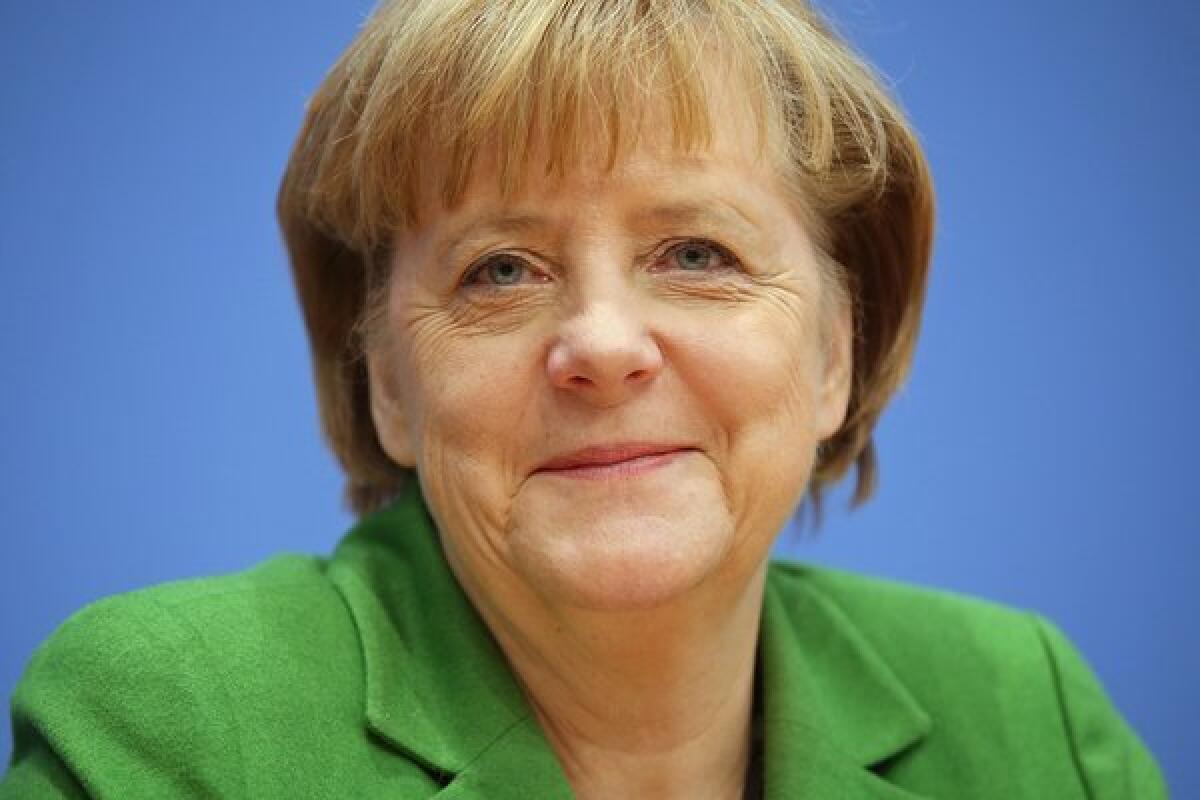Merkel’s conservatives strike power-sharing deal with German rivals

German Chancellor Angela Merkel talks to reporters after leaders of the main political parties agreed on a common agenda.
- Share via
LONDON -- More than two months after voters cast their ballots, Germany took a major step toward finally forming a government Wednesday after leaders of the main political parties agreed on a common agenda that Chancellor Angela Merkel said would solidify her country’s sound financial position and promote social welfare.
The deal paves the way for Merkel’s conservative Christian Democratic Union, or CDU, and its archrival, the center-left Social Democrats, to unite in a “grand coalition” overseeing Europe’s strongest economy.
But the political uncertainty that has prevailed since Germany’s Sept. 22 election is not entirely over. The power-sharing agreement has to be ratified by a mid-December vote of the Social Democratic Party’s 470,000 members, who could yet spurn the idea of joining forces with their nemeses.
Leaders expressed hope that the fruit of their marathon negotiations over the last several weeks would prove acceptable to the rank and file on both sides. If so, that would see the installation of Merkel, Germany’s most popular politician, in her third term as chancellor, serving until 2017. She took up the post in 2005.
“The spirit of this agreement shows that we are a grand coalition in order to deal with the grand tasks for Germany,” Merkel told reporters Wednesday, listing her priorities as “robust finances, robust prosperity and social security.”
The Christian Democrats were able to maintain their pledge not to raise taxes, despite Social Democrats’ demand during the election campaign that the rich pay more into the public purse. The coalition deal also throws a sop to the CDU’s Bavarian sister party, the Christian Social Union, by proposing a highway toll for foreigners, which could fall afoul of European Union rules.
The Social Democrats were able to win some concessions of their own, foremost of which is agreement to introduce a national minimum wage, set at 8.50 euros (about $11.50), beginning in 2015. Some pensions are also to be increased.
“The grand coalition has written a coalition agreement for the little people,” said Sigmar Gabriel, chairman of the Social Democrat Party, or SPD.
Other Europeans might be disappointed by the joint agenda, which does not include any softening of Berlin’s approach to the euro debt crisis. Though Merkel reiterated her usual line that “Europe is indispensable for Germany,” her party insists on continued austerity in countries such as Greece and Portugal as the price of German financial assistance.
Gabriel, who is likely to become vice chancellor in a grand coalition, is taking a bit of a gamble with his plan to put the power-sharing deal to a grass-roots vote. The idea strengthened his hand in talks with the CDU, but if his party shoots down the agreement, his position as chairman could be fatally weakened, and Germans unhappy with the current uncertainty could blame the SPD for prolonging it.
Ratification by the Social Democrats’ rank and file is not assured. Many are leery of teaming up with their archrivals after what happened the last time they did so, during Merkel’s first term as chancellor. Voters who felt that the two big parties had become almost indistinguishable punished the SPD in 2009 with the party’s worst electoral result since World War II.
In September’s election, Merkel’s conservatives won the most seats in the Bundestag by far but fell short of a majority, forcing them to find a governing partner. She is believed to prefer a grand coalition with the Social Democrats, if only because the CDU is unlikely to reach agreement with the other parties, such as the Greens.
The business-friendly Free Democrats, the junior partner in Merkel’s last government, were ousted from Parliament for the first time in their history.
[For the record, 1:12 p.m., Nov. 27: An early version of this post incorrectly stated that Germany is Europe’s biggest country.]
ALSO:
Pakistan names career infantry officer as new military chief
Italy’s Senate expels Silvio Berlusconi after tax fraud conviction
Why Ukraine is staying in Russia’s orbit instead of turning West
Twitter: @HenryHChu
More to Read
Sign up for Essential California
The most important California stories and recommendations in your inbox every morning.
You may occasionally receive promotional content from the Los Angeles Times.











